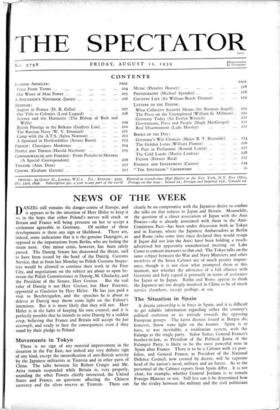Movements in Tokyo
There is no sign of any material improvement in the situation in the Far East, nor indeed any very definite sign of any kind, except the intensification of anti-British activity by the Japanese militarists at Tientsin and in other parts of China. The talks between Sir Robert Craigie and Mr. Arita remain suspended while Britain is, very properly, sounding the other Powers chiefly interested, the United States and France, on questions affecting the Chinese currency and the silver reserve at Tientsin. There can clearly be no compromise with the Japanese desire to confine the talks on that subject to Japan and Britain. Meanwhile, the question of a closer association of japan with the Axis Powers—she is already associated with them in the Anti- Comintern Pact—has been under discussion both in Tokyo and in Europe, where the Japanese Ambassadors at Berlin and Rome (who some time since declared they would resign if Japan did not join the Axis) have been holding a much- advertised but apparently unauthorised meeting on Lake Como to concert measures to that end. The Tokyo talks on the same subject between the War and Navy Ministers and other members of the Inner Cabinet are of much greater import- ance, though it is not clear what prompted them at this moment, nor whether the advocates of a full alliance with Germany and Italy regard it primarily in terms of assistance for Japan or by Japan. Berlin and Rome appear to think the Japanese are too deeply involved in China to be of much service elsewhere, except perhaps at sea.








































